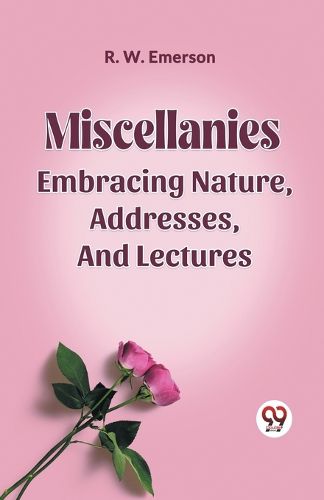Readings Newsletter
Become a Readings Member to make your shopping experience even easier.
Sign in or sign up for free!
You’re not far away from qualifying for FREE standard shipping within Australia
You’ve qualified for FREE standard shipping within Australia
The cart is loading…






This title is printed to order. This book may have been self-published. If so, we cannot guarantee the quality of the content. In the main most books will have gone through the editing process however some may not. We therefore suggest that you be aware of this before ordering this book. If in doubt check either the author or publisher’s details as we are unable to accept any returns unless they are faulty. Please contact us if you have any questions.
"Miscellanies" is a group of various works by Ralph Waldo Emerson, an important American essayist and seeker of truth. This series of lectures, essays, and speeches indicates Emerson deep understanding of many aspects of human lifestyles, thought, and society. The portions cover a wide variety of genres and topics. "Miscellanies" shows Emerson's transcendentalist idea, which stresses how proper humans are with the aid of nature and the way critical it's miles to be impartial. The display talks about a number of different things, like nature, friendship, school, and the character's area in society. "Nature," wherein Emerson explores the spiritual hyperlink among people and nature, and "The American Scholar," which promotes intellectual freedom and actual interest, are two vital pieces. Emerson's beautiful writing and deep philosophical thoughts encompass "Miscellanies," which is a wealthy source of awareness and a mirror photo. Along with political troubles of the time, the show also talks approximately social troubles like slavery and the way ladies and men can assist society circulate forward. Emerson had an effect on more than simply writing; he modified the intellectual and cultural panorama of America within the 1800s. "Miscellanies" is a testomony to his lasting effect; it gives readers a wide range of insights into how he thought approximately human happiness and the search for a significant existence.
$9.00 standard shipping within Australia
FREE standard shipping within Australia for orders over $100.00
Express & International shipping calculated at checkout
This title is printed to order. This book may have been self-published. If so, we cannot guarantee the quality of the content. In the main most books will have gone through the editing process however some may not. We therefore suggest that you be aware of this before ordering this book. If in doubt check either the author or publisher’s details as we are unable to accept any returns unless they are faulty. Please contact us if you have any questions.
"Miscellanies" is a group of various works by Ralph Waldo Emerson, an important American essayist and seeker of truth. This series of lectures, essays, and speeches indicates Emerson deep understanding of many aspects of human lifestyles, thought, and society. The portions cover a wide variety of genres and topics. "Miscellanies" shows Emerson's transcendentalist idea, which stresses how proper humans are with the aid of nature and the way critical it's miles to be impartial. The display talks about a number of different things, like nature, friendship, school, and the character's area in society. "Nature," wherein Emerson explores the spiritual hyperlink among people and nature, and "The American Scholar," which promotes intellectual freedom and actual interest, are two vital pieces. Emerson's beautiful writing and deep philosophical thoughts encompass "Miscellanies," which is a wealthy source of awareness and a mirror photo. Along with political troubles of the time, the show also talks approximately social troubles like slavery and the way ladies and men can assist society circulate forward. Emerson had an effect on more than simply writing; he modified the intellectual and cultural panorama of America within the 1800s. "Miscellanies" is a testomony to his lasting effect; it gives readers a wide range of insights into how he thought approximately human happiness and the search for a significant existence.